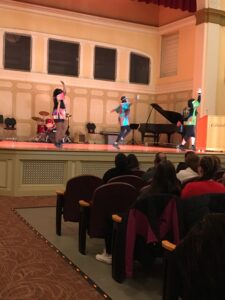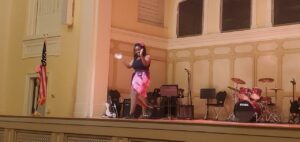During Black History Month (February), I went to many events that were held in honour of BHM, mainly because of performances, yet one, out of the many, events that stood out to me and that was fun to attend to was the Africana Studies Department: Artistic Groups Event, which was held on the last day of the month (February 29th), in the Brown Auditorium. This event was held by Dr. Michael Tillotson and Mr. Bruce Mattingly to highlight different artistic groups on campus that embodies the Arts in African Culture. The groups that were presenting were the SUNY Cortland Gospel Choir, SUNY Cortland Blues Ensemble, and SUNY Cortland Africana Dance Class, taught by the one and only, Dr. Yomi Lee.
The event started off with the Gospel Choir singing Lift Every Voice and Sing, also known as the Black National Anthem, and this was sung alone by the President and Vice President of the Choir, Michelle (P) and Michaile (VP) Graham. After singing, the rest of the choir, led by the choir director Mr. Steven Cox (on piano), sung Forever You’re My King by Carlton Pearson, honouring the Gospel. Right after Gospel Choir, the Blues Ensemble went next, they started off with Jazz Blues, each student playing different instruments, except voice, it wasn’t until later on when they were close to ending their 30 minute performance, when they started adding voice to their performance, but it wasn’t words that we could understand that was used, they were singing yes, but not with the English Language, in the end however, they had an outstanding performance that was honouring music in African Culture. Last but not least, they had the Africana Dance Class end out the whole event. There were three dances, the first one being KuKu, a dance that was used to celebrate fishermen coming back from the sea, this dance was done by Dr. Yomi Lee and a student named Tiarra Sellers. The second dance was called Feel It Africa which led into the third dance named Unavailable, both dances being Modern Afro Dance/Afrobeats, in which it represents cultural pluralism and resilience. The second one was danced by Dr. Yomi Lee, Tiarra Sellers and Michelle Graham, while the third one was a solo by Michelle Graham, with Dr. Lee being a backup dancer. The whole performance by the Africana Dance Class honoured the different meaning of dance in African History throughout time.
All performances that night did exceptionally well while honouring Arts in African Culture. Dr. Michael Tillotson then closed the event by saying thank you to all who came out and all who performed, for it was indeed a prestigious event.


